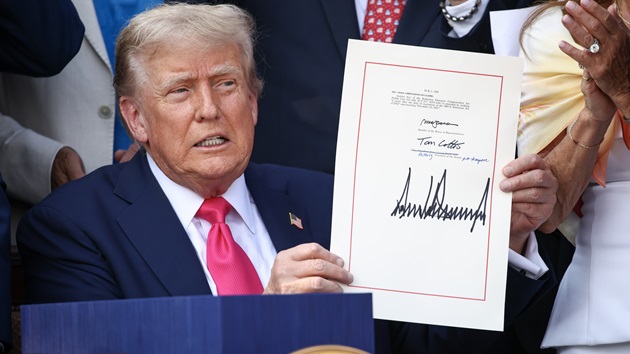
(WASHINGTON) — President Donald Trump’s signature tax and spending megabill could alter aspects of K-12 and higher education in the coming years, according to education advocates on both sides of the aisle.
After a monthslong process on Capitol Hill, the highly anticipated law will significantly reform the student loan process and broaden school choice options for families and the education community at large.
Here’s how the new law, which also brings massive cuts to government benefits such as Medicaid and increases funding for immigration enforcement, potentially changes education for millions of Americans.
Student loans
The megabill pushed through several House Republican policies aimed at reforming higher education — including with student loans.
The new law terminates all current student loan repayment plans for loans disbursed on or after July 1, 2026. They will be replaced with two separate plans: a standard repayment plan and a new income-based repayment plan called the Repayment Assistance Plan, according to the text of the megabill.
The Department of Education released a statement that said these new plans are currently impacted by legal challenges, urging borrowers on the Biden-era Income Driven Repayment plans to consider enrolling in an income-based repayment plan.
With this new process, Education and Workforce Committee Chairman Tim Walberg, a Republican, said he believes struggling borrowers will receive the assistance needed to repay loans without saddling taxpayers with that burden.
The new law also establishes loan limits for parent borrowers and terminates graduate and professional plus loans — designed to help graduate and professional students pay for school — for their degrees and certificates.
Earlier this year, Education Secretary Linda McMahon applauded the megabill for simplifying the “overly complex” repayment process and reducing borrowing amounts to “help curb rising tuition costs.”
The Student Borrower Protection Center, which focuses on eliminating the burden of student debt, denounced the provisions in the bill. Aissa Canchola Bañez, the center’s policy director, described it as a crushing blow to millions of Americans already struggling to cover college costs.
“This bill is a dangerous attack on students, working families and communities across the country,” she said, adding that it is “shredding the student loan safety net, weakening protections and pushing millions of students and families into the riskier and more expensive private student loan market.”
National Parents Union President Keri Rodrigues warned the new policies in Trump’s megabill are leading to a “difficult moment for American families.”
Rodrigues fears a $65,000 lifetime limit on Parent PLUS loans — which provide money to parents for their children to attend college — could eliminate a pathway to “economic mobility.”
“It’s going to mean a lot of hardship for kids and for families across the country,” she said.
School choice
Conservatives are celebrating the law as it continues to deliver on a long-standing pledge from the Trump administration to give power to parents and reduce education bureaucracy in Washington through universal school choice — something McMahon has pushed to see expanded nationwide.
Republican Sen. Bill Cassidy’s Educational Choice for Children Act tax credit, a provision included within the megabill, provides a charitable donation incentive for individuals and businesses to fund scholarship awards for students to cover expenses related to K-12 public and private education starting in 2027.
Republican Rep. Adrian Smith, who co-sponsored the House legislation, told ABC News it removes the “politics” from school-funding formulas that haven’t served students’ best interests.
“Students deserve the opportunity to succeed in the setting which best meets their needs, and this investment will open new doors for millions of American families,” Smith said.
Tommy Schultz, CEO of the conservative American Federation for Children, noted the change is a monumental step toward every state achieving school choice.
“AFC will work to ensure that governors and state leaders listen to their constituents and bring educational freedom to every state in the nation, and to as many families as possible,” Schultz said in a statement to ABC News. “We will continue to fight to ensure that this tax credit scholarship is well-implemented and expanded as soon as possible.”
Democratic Sen. Mazie Hirono is a staunch opponent of the president’s education policies and the Republican tax credit, saying it strips public schools of its resources and enriches wealthy families.
“What [the ECCA] does is it is yet another big tax break for rich people who can afford to contribute these kinds of funds — so mainly the people who will take advantage of this will be kids who are already going to private schools,” Hirono explained.
“Not much of a choice,” she quipped.
American Federation of Teachers President Randi Weingarten also slammed the bill for promoting a “massive and unprecedented transfer of wealth from everyday people to billionaires.”
“It writes a permanent school voucher scheme into the tax code that would redirect billions of dollars each year to private schools — even as our public schools, which educate 90 percent of all students, remain woefully underfunded,” Weingarten said in a statement to ABC News.
Despite the public school debate, Sen. Cassidy and education advocates argue no child should be “trapped” in a failing school.
Dr. Eva Moskowitz is the CEO of Success Academy Charter Schools, the highest-performing free public charter school network in New York City, and told ABC News that it’s time to move on from the public education “monopoly.”
“We have a solution right in front of us: high-performing charter schools and a scholarship program for the private school choice,” Moskowitz said. “This is the most concrete, pragmatic, thing we can do today to impact hundreds of thousands of children.”
Copyright © 2025, ABC Audio. All rights reserved.




